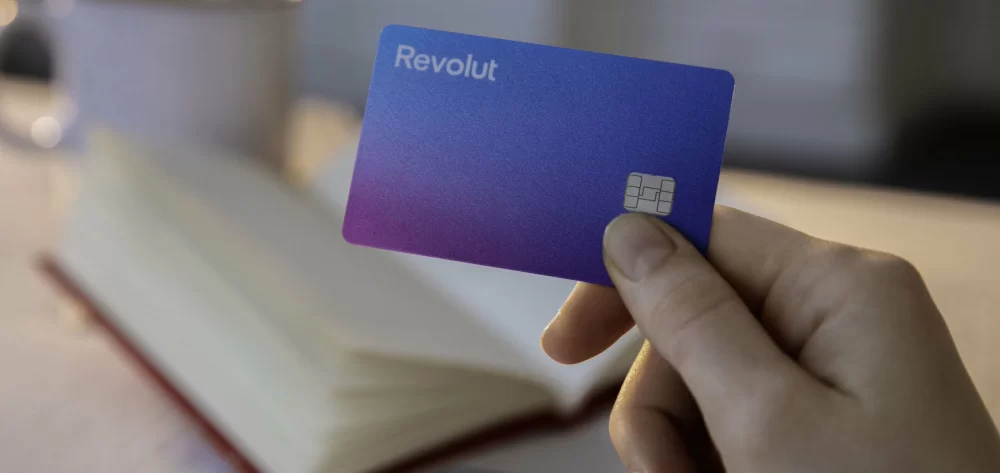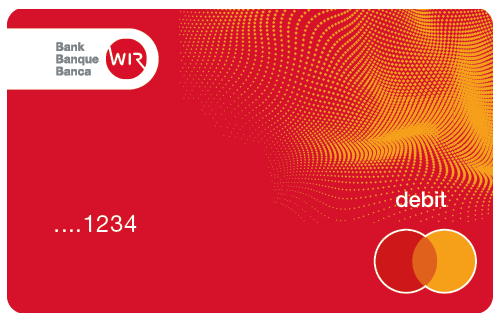Important: This moneyland.ch guide is provided for informational purposes because Revolut has a substantial user base in Switzerland. moneyland.ch does not have a business or editorial relationship with Revolut. This article should not be construed as a recommendation to use Revolut. If you use Revolut and encounter problems with its services, you should contact Revolut for assistance.
1. What is Revolut?
Revolut is a UK-based neobank. Its basic services include a digital account for managing money, and various Mastercard, Maestro, and Visa payment cards. Revolut has positioned itself in the market with low fees and favorable currency exchange rates.
The British neobank Revolut has hundreds of thousands of customers in Switzerland, making it the most popular neobank at this point in time.
Revolut is not a fully-licensed bank. However, it does have E-money institution licenses in the United Kingdom and Lithuania.
2. Which services does Revolut offer?
Revolut offers cards that can be used to pay for purchases from brick-and-mortar and online purchases. You can manage these cards using the Revolut app on your iPhone or Android device.
There are many different settings that you can manage using the app. All transactions are shown in the app in real-time.
3. Is money in Revolut accounts covered by Swiss bank depositor protection?
No. Revolut has E-money licenses in the UK and Lithuania. Money that you deposit in your Revolut account is not covered by Swiss bank depositor protection.
If Revolut were to go bankrupt, you as a Swiss customer would have to engage in the bankruptcy process in the UK or in Lithuania.
4. Is Revolut a Swiss bank?
No, Revolut is not a Swiss bank.
Revolut does not have a bank license. It has E-money licenses from the UK and Lithuania which allow it to manage assets on behalf of customers. But Revolut is required to keep all customer money at licensed banks, and cannot engage in lending itself.
5. How can I deposit money into my Revolut account?
The simplest and cheapest way to deposit money into your Revolut account as a Swiss customer is to make a bank transfer to Revolut’s Swiss bank account. Swiss banks normally do not charge you fees for transfers to other Swiss bank accounts. Important: In order for Revolut to accept your transfer and credit it to your Revolut account, you have to specify the provided reference code and other important information.
You can also load your Revolut account using a credit card. However, you may be charged high fees for loading your account this way in some cases.
6. Which cards does Revolut offer?
Revolut offers cards from Maestro, Mastercard, and Visa. Which cards are available varies between customers and can also change over time.
7. Can I make transfers with Revolut?
It is possible to transfer money to both Swiss and foreign bank accounts using Revolut. But this is best avoided because you may be charged hidden fees for these transfers.
8. Which currency exchange rates does Revolut use?
In its advertising, Revolut says that it uses interbank exchange rates. A moneyland.ch analysis showed that Revolut often does have very favorable currency exchange rates. But exchange rates can also be high depending on the currency and the date on which the exchange is made.
Wise and Neon both had slightly more favorable exchange rates than Revolut for the currencies included in the moneyland.ch analysis.
9. Which currency exchange fees does Revolut charge?
Revolut has somewhat complicated currency exchange fees.
The currency exchange fees for the free Standard account and the paid Plus account are as follows:
When you transact less than 1250 francs per month, then these foreign transaction fees apply:
• No currency exchange fees for transactions in most major currencies on weekdays.
• 1 percent currency exchange fee for transactions in most major currencies on weekends.
• 1 percent currency exchange fee for transactions in other currencies on weekdays.
• 2 percent currency exchange fee for transactions in other currencies on weekends.
When you transact more than 1250 francs per month, these foreign transaction fees apply:
• 0.5 percent currency exchange fee for transactions in most major currencies on weekdays.
• 1.5 percent currency exchange fee for transactions in most major currencies on weekends.
• 1.5 percent currency exchange fee for transactions in other currencies on weekdays.
• 2.5 percent currency exchange fee for other currencies on weekends.
If you use a paid Premium or Metal account, then you will always be charged the lower fees.
Tip: You can cut the cost of currency exchange fees by only exchanging money on weekdays. You can keep the foreign currency in a sub-account. When you use your card to make payments in that foreign currency, the purchase will be charged to the foreign currency available in the sub-account. By doing this, you avoid the higher currency exchange fees that apply on weekends.
10. Can I use Revolut for cash withdrawals?
Yes. You can withdraw money from your Revolut account at ATMs. Revolut charges a cash withdrawal fee equal to two percent of the amount you withdraw. But the fees are waived for a certain amount of cash withdrawals every month:
- 200, Swiss francs, British pounds, or euros per month for Standard and Plus account users.
- 400 francs, pounds, or euros for Premium account users.
- 800 francs, pounds, or euros for Metal account holders.
11. Can I use Revolut for mobile payments?
Yes. Revolut cards can be linked to Apple Pay and Google Pay. Revolut does not support the Swiss Twint mobile payment service.
12. How much do Revolut cards cost?
Revolut charges a one-time fee for new physical cards (seven francs for postage, for example). This fee may be waived as part of special promotions.
Revolut also offers virtual cards at no extra charge.
13. What is a virtual Revolut card?
Revolut offers a virtual credit card which only exists in the app, but not as a physical card.
One advantage of the virtual card is that you can use it as soon as your account is approved, without having to wait for a physical card to arrive. The virtual card can be linked to Google Pay or Apple Pay to enable payments from brick-and-mortar merchants.
The virtual card includes all of the information needed to make online purchases, including the card number, expiry date, and the CVC2 or CVV2 code.
14. Are there limits for Revolut transactions?
In general, the amounts you can transact with the Revolut card are only limited by your account balance.
Standard and Plus account users should pay attention to the 1250-franc monthly threshold for the lower currency exchange fees. Depending on which account you use, there are also limits on fee-free cash withdrawals. These limits are 200, 400, and 800 francs, euros, or pounds respectively.
15. Is it possible to set up standing orders in Revolut?
Yes, you can set up standing orders in Revolut. However, using Revolut for transfers – including standing orders – is generally not recommended, as you may be charged high fees in some cases.
16. Can I use eBills and direct debit orders in Revolut?
Revolut does not offer Swiss direct debit orders and eBills.
But Revolut users in Switzerland can use SEPA direct debit orders for charges in euros, and UK direct debit orders for charges in British pounds. This can be done using the account numbers of the euro bank account and UK bank account respectively.
17. Does Revolut also offer savings accounts or pillar 3a accounts?
No. Revolut does not give you any Swiss bank accounts, savings account, or pillar 3a accounts.
18. Does Revolut give me my own bank account number?
You do not get a Swiss bank account number from Revolut.
Revolut does give you a UK bank account. Revolut also gives certain customers a euro-denominated bank account with a Lithuanian IBAN, but the conditions for getting this account as a resident of Switzerland are unclear. If you need a euro bank account, get in touch with Revolut and request one. Revolut customers complain about repeated problems with the euro account. These issues stem from the fact that Revolut’s euro accounts use a Lithuanian IBAN, but a British BIC code. Some Revolut customers report that the recipients’ banks charge the recipient a fee to receive transfers sent from Revolut accounts. That can affect bank transfers from the Revolut euro account to a euro account at a different bank. It is best to ask the customer services of both Revolut and the recipient’s bank about the actual fees that would apply to a transfer.
19. Can I overdraw a Revolut account?
No. Revolut accounts do not allow for overdrafts.
20. Can I invest in stocks using Revolut?
Revolut advertises fee-free stock trading. However, Revolut’s stock brokerage service is not yet available to customers in Switzerland.
21. Can I invest in gold and silver using Revolut?
Yes, customers in Switzerland can use Revolut to invest in gold and silver.
Revolut says that the precious metals you buy are held in your name by a financial services provider. However, Revolut does not give you the option of actually withdrawing your precious metal in physical form.
22. Can I buy cryptocurrencies using Revolut?
You can invest in Bitcoin, Ethereum, Bitcoin Cash, and Litecoin using Revolut. However, you cannot buy actual withdrawable cryptocurrency. You simply participate in the performance of cryptocurrency prices.
23. What are the advantages of Revolut?
The favorable currency exchange rates and the intuitive app with many different features are Revolut’s biggest advantages. Another advantage is that you can track transactions in real-time using the app.
24. What are the disadvantages of Revolut?
The biggest disadvantage of Revolut is its customer service. The poor quality of Revolut’s customer services is a source of frequent negative feedback from Swiss Revolut users.
Another disadvantage, compared to Swiss financial services providers, is that the money in your Revolut account is not guaranteed by the Swiss bank depositor protection scheme. Revolut does not give you a Swiss bank account, so it is poorly suited for receiving a Swiss salary into, or for paying bills in Switzerland.
More on this topic:
Compare Swiss bank accounts now
Compare Swiss credit cards now

 Deal of the Day
Deal of the Day 







